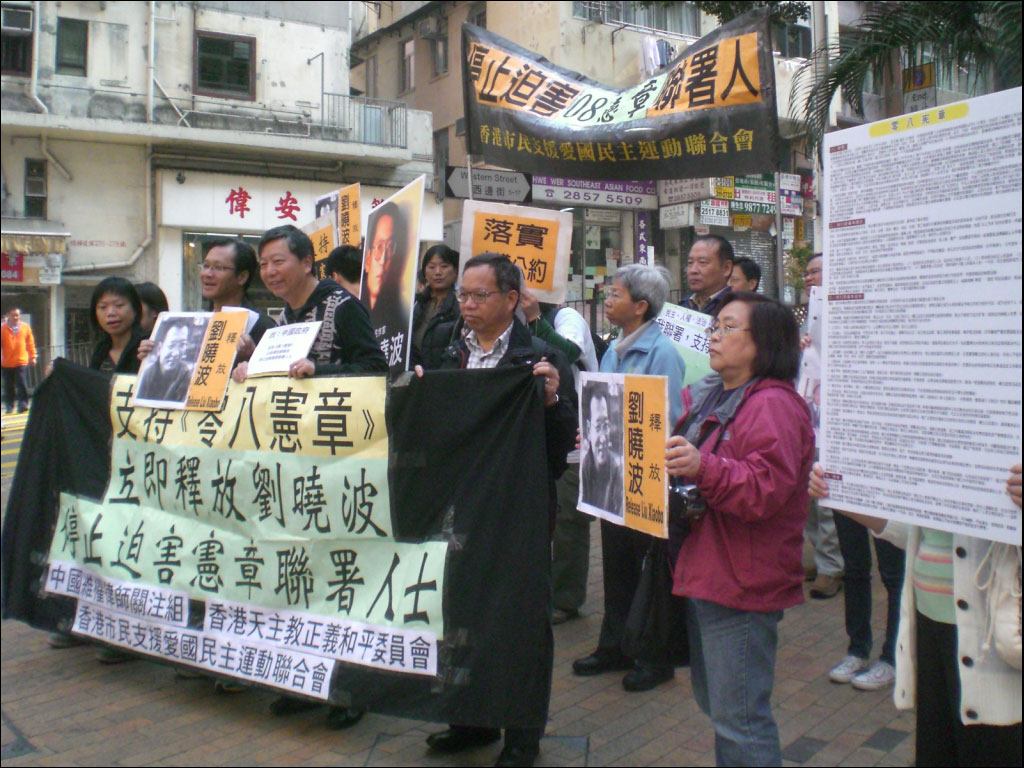By Josepha Laroche
Translation: Davina Durgana
Passage au crible n°31
 Source: Wikipedia
Source: Wikipedia
This past 10th of December, during the award ceremony of the Nobel Peace Prize, the winner – Chinese dissident Liu Xiaobo – was absent because he is currently in his country serving a prison sentence of eleven years for “subversive activities”. Despite the pressure exerted on Peking, he has been considered for over a year as one of the main players. Finally, the Nobel committee has awarded him this prize on October 7th, 2010 “for his enduring non-violent efforts in support of human rights in China”, an award described as an “obscenity” by Chinese authorities.
> Historical background
> Theoretical framework
> Analysis
> References
Since 1901, the Nobel Prize award ceremony has occurred every year on December 10th. This day marks exactly the anniversary of the death of Alfred Nobel (1833-1896), the founder of this prize system. Inventor, industrialist, financier, literary man, and additionally a pacifist, this Swedish philanthropist at the head of one of the first transnational firms, decided through his will on November 27th, 1985 to devote his immense fortune to the creation of five annual prizes, of which four would be awarded in Stockholm1: physics, physiology or medicine, and literature. As for the Peace Prize, Nobel expressly requested that the award would be granted within the Norwegian Parliament, the Storting. At that time, the chamber in Oslo represented, in effect, one of the rare assemblies in Europe, truly democratic. Additionally, an activity that has already been deployed in favor of peace seemed to Alfred Nobel more decisive than the Swedish-Norwegian conflict, but then very contested. The entrepreneur designated from the Norwegian Chamber in order to ensure the management of the prize selection, considered who was the most qualified and the most legitimate. As Nobel did not share the utopian views of his pacifist friends, he looked to promote a new pacifist technology to form a device both new and original. In order to do this, he conceived a symbolic tool branding the mark of humanitarianism, of science, and of ideological meritocracy. Therefore, what has taken form from over a century is a system of international gratifications that honors individuals and transcends State borders, while refusing the nationalism that its founder detested.
Recall that the Chinese dissident Liu Xiaobo has played a central role in the drafting of the Charter 08, a manifest published by intellectuals and militants reclaiming freedom of expression and pluralist elections in China. This former professor of literature had equally been one of the leaders of the student demonstrations in Tiananmen Square in 1989, events through the course of which he had notably led a hunger strike. In the matter of his absence from the ceremony, it must be noted that this is not the first time that a Nobel laureate has been unable to receive their prize. This interdiction has followed many similar decisions. In 1958, for example, Soviet writer Boris Pasternak, was not able to go to Stockholm to receive his Nobel Prize in Literature and the same occurred in 1970 for the novelist, Alexandre Soljenitsyne. More recently, in 1975, the academic and physicist, Andrei Sakharov, did not have the opportunity to obtain his visa from Soviet authorities to receive his Nobel Peace Prize. Finally, in the same fashion, the dissident opposing the Burmese Junta, Aung San Suu Kyi, was not permitted to go to Oslo in 1991.
A non-state diplomacy. The allocation of the Nobel prizes – which has been mentioned – has instituted as time has gone by, a diplomacy – the Nobel diplomacy – which is characterized by a strong global cohesion and a constant determination to prevail the Nobel glory in facing State actors. This is why, this process of Nobelization often has the finality of contradiction – that is to say condemn – the politics of one or many against each other.
A moral diplomacy. The Nobel Institution stands as a universal conscience and moral entrepreneur. In this aspect, it means to embody values such as liberty, knowledge and impartiality. It can be considered to this end as the most solid defender of human rights opposing the national interests of States. Through its laureates, the Nobel institution represents an elite militant, a true international ministry that grants a right of interference in the internal affairs of States in the name of the universality of human rights and the preservation of world peace.
Regarding the radicalism of the Nobel diplomacy, Chinese authorities have been engaged in a vast diplomatic offensive from the beginning to attempt for the first time to modify the decision of the Committee and to prevent any distinction from being accorded to Liu Xiaobo. However, the proclamation on October 7th sounded like the first failure and stigmatization of their politics. For their part, the Chinese have intervened in gaining support from foreign chancelleries in order to have a massive boycott of the ceremony. However, despite their repetitive pressures, only twenty countries – among them, Afghanistan, Saudi Arabia, Cuba, Iran, Pakistan, Russia, Sri Lanka and Venezuela – have finally declined the invitation from the Nobel Institute. In return, the sixty-five countries, which have arranged for diplomatic representation at Oslo have decided that it is essential to be present. Among those who were present, we must quote for example, the United States, Germany, France, United Kingdom and Brazil which have decided not to give in to the warning and threats that have been significant by Peking.
The choice of Liu Xiaobo heralds a diplomatic line, which demonstrates that the Nobel diplomacy towards China has remained constant over time. In effect, one should not forget that in 1989, the jury of Oslo awarded the Prize to the spiritual leader of Tibet, the Dalai Lama, only four months after the Spring of Peking and thirty years after the uprising of Lhassa. At this time, this decision offered, in a very significant manner, international recognition to the Tibetan cause, which opened the Chinese to criticism as already encouraging spinelessness. In effect, if the living God has been attempting to obtain self-determination of Tibet through Pacifist means, he will yet stay that way until diplomacy is isolated. Many times it has been proposed to Peking to undertake very moderate compromises; suggesting for example, that Tibet would have a status similar to Hong Kong, in virtue of the principle of one country, two systems. In the designation of Xiaobo, the Jury of Oslo holds an emphasis on how the laureate was “systematically opposed to the recourse to violence”. In other words, this Prize represents all at once a condemnation of Chinese politics and an invitation directed at its leaders for the negotiation and settlement of the Tibetan question with the new laureate.
As China is not yet open to democracy, it has not stopped for over twenty years to reinforce their power on the global scene towards the end of becoming today the main rising challenger facing the American hegemon. In certain respects, does China not constitute from this point forward with this latest conflict, a world director, the G2? However, despite this new order, the Nobel line remains rigorously the same: it vacillates between moral condemnation and the incitement of dialogue. That is to say that when they decided to honor the fight of a Chinese citizen for peace, democracy and human rights, the Nobel Committee radically refused – whereas some States accepted – to recant their decision when faced with Chinese reproaches.
Laroche Josepha, Les Prix Nobel, Paris, PUF, 1995, the book will be soon republished.
http://nobelprize.org/nobel_organizations/
http://fr.rsf.org/chine-liu-xiaobo-biographie-28-10-2010,38695.html
http://fr.globalvoicesonline.org/2010/10/12/46516/
1. The Economics Prize was not created until 1968 by the Swedish Bank, on the occasion of its tercentennial and dedicated to the memory of Alfred Nobel.




